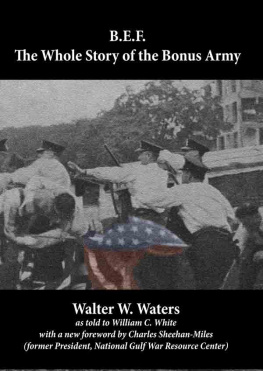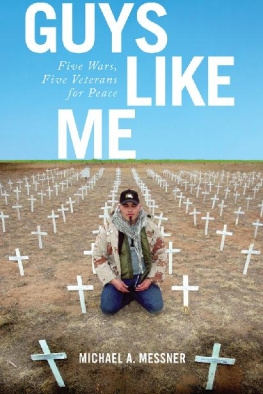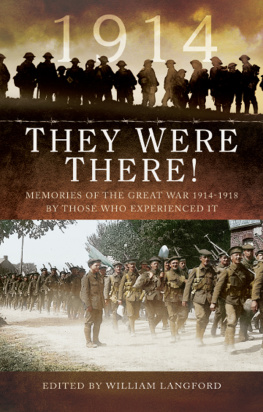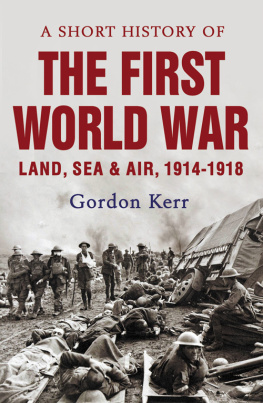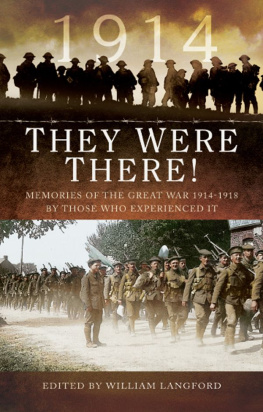
TURNER PUBLISHING COMPANY

TURNER PUBLISHING
COMPANY
The Front Line of Military History Books
Copyright 1993 Turner Publishing Company
All rights reserved.
Turner Publishing Companys Staff:
Douglas W. Sikes: Publishing Consultant
Trevor W. Grantham: Project Coordinator
David Polk: Author
Luke A. Henry: Designer
This book or any part thereof may not be reproduced without the written consent of the Publisher
This publication was compiled using available information. The publisher regrets it cannot assume liability for errors or ommissions.
Library of Congress
Catalog Card No. 93-060962
ISBN: 978-1-68162-311-5
Limited Edition
TABLE OF CONTENTS
Personal War Stories by the Veterans of
World War One
OVER THE TOP
VETERANS OF THE FIRST
WORLD WAR
INTRODUCTION
As we approach the end of the 20th century and glance back, two world wars tower above the rest like bloody beacons. On the seventy-fifth anniversary ending World War I, we might well pause, look back, and recall our involvement in that great war. Its great cost demands we consider and reconsider our expense. The more than 117,000 American lives lost are the most obvious loss, but the final cost is incalculable. Such a price compels our reflection over and over again as each generation inherits the grave legacy of this conflict.
The horror, sacrifice and heroism of World War I live not only in the history books, but in the memory of some 50,000 American veteransmost in their ninth decade of life now. What was the experience of that era like for them? It is the purpose of this book to suggest some answers in pictures and words to that question. You will find this book to be, for the most part, and overviewa birds eye view including commentary and evaluation of key aspects of the war.
It will begin with some brief background the wars causes, the erosion of American neutrality, our military and home front build up. After that, rather than recount our achievement battle by battle, we will look more closely at our soldiers unique experience in trench warfare and the kind of offensive warfare it dictated. We will then reflect on the special contribution made by our Navy, Air Corps, and Marines. We will describe innovations in weaponry such as the tank, describe the medical service, and the plight of our prisoners of war. And finally, we will see how those who fought this great war moved to perpetuate their bonds in the American Legion.
PRELUDE TO WAR
In July and August of 1914, a dark cloud began to grow over Europe which would eventually engulf much of the whole world. War had broken outtension created by a web of alliances and old festering animosities had finally upset the delicate balance between the Central Powers (Austria-Hungary, Germany, and Italy) and the Allies (Russia, France, and Britain). Americans watched with bated breath.
Then on August 4, 1914, President Woodrow Wilson made his proclamation of US neutrality. We must remain neutral, he said, not only in act but in word and thought. Not the least reason for doing so was the nature of the wars immediate causes. Legitimate grounds were difficult to find. Seldom had human frailty so clearly been responsible for a major conflict; everywhere the clear-eyed could see overweening pride, fanatical nationalism, uncompromising belligerence, corruption, and indecisiveness in the leadership of Europe.
In addition, President Wilson and his government knew quite well that America consisted of nearly one third European immigrants, and any stance but neutrality might touch off, if not a civil war, at least an unpredictable conflict among citizens whose old country ties were strong. There were especially large segments of German and English peoples. There were Irish people whose antipathy toward England was hot. There were Russian-American Jews who deeply resented their relatives treatment in Czarist Russia, and so on.
And there were many other good reasons for not entering this war. Obviously, internal security was not yet seriously threatened. Also, American banks were successfully loaning money to both sides, and the economic recession of 1914 was ending with the boom in the war material business. England and France were especially dependent on US supplies and credit. Besides, the European leaders made no bones about itboth sides said it would be over quickly, and both, of course, predicted they would win handily. A German General Staff officer said it would only take four months to cut down those dreaming sheep.
Of course, it would not end quite so fast. How long could Woodrow Wilson could the United States abstain? How long could the country remain uninvolved in the war of all wars? A photograph of a 1916 Democratic National Committee publicity truck was plastered with signs asking the voter to re-elect President Wilson because it is he Who Keeps Us Out of War? Vote for Wilson-Peace with Honor. Five months later, after his successful re-election, the President declared war on Germany. Let us look closer at this gradual drift toward the war that Wilson and many Americans fervently hoped to avoid.
NEUTRALITY ENDS
In spite of announced neutrality, from the beginning the President, his close associates, and much of America was sympathetic to the Allies. A number of other factors drew the country gradually from her neutral stand, for instance, bold headlines beckoned to the prospective young Americans, resulting in unprecedented volunteerism. In their very first move, the Germans offended many Americans by violating Belgian neutrality. They shelled the neutral city of Antwerp. These acts and many to follow were characterized by Prussian militaristic arrogance which did not go down well with the average American. Even before August 1914, the Kaiser (Wilhelm II) was not only encouraging Mexico to go war against the US but was actually shipping arms to Mexico.
Britain, on the other hand, was a long-time friend and trading partner with whom the U.S. shared a common heritage. The US media was biased in favor of the British and the French. In the eyes of the average man of military age the English were to win the propaganda battle against the Germans. Horror stories about the Hun and his brutality as a soldier abounded in the American press. Closer to home, the German naval attache in Washington was exposed in espionage activities.
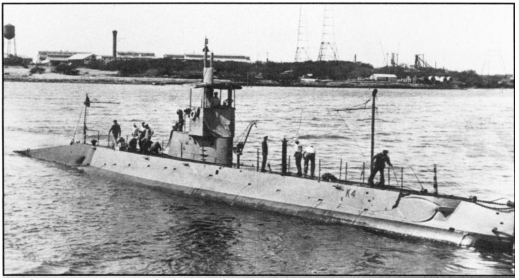
A submarine prepares to dock at Pearl Harbor. The pictured submarine may be the SS35 Kentucky (ex Walrus ). She was built at the Moran Co., Seattle, WA. Her keel was laid Jan. 27, 1912, commissioned Oct. 24, 1914, Lt. J.P Olding, commanding. (Brandis)
Thus, as the grim war wore on, our neutrality eroded. Another major factor was certainly Germanys unrestricted submarine warfare. The sinking of the British luxury liner Lusitania whose passengers included 114 Americanswas an incendiary act by a German U-boat. Not least important, US trade was being interruptedAmerica couldnt do worldwide business as usual since merchant vessels were never safe from German torpedoes. Now and then, the Kaiser restricted his submarines to placate one or another neutral nation, but then the lawlessness would begin again. German strategy called for a U-boat offensivebeginning February 1, 1917against all nations shipping; and as a result, more Americans were to die. Clearly, the Germans did not think the US much of a threat should she enter the war. They assumed it would simply take too long to get troops to Europe should it be decided to act.
Next page

